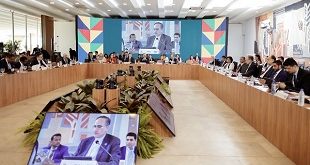
By Andrew M. Mwenda
“Where Besigye projected himself as a national statesman, Museveni positioned himself as a local politician. Where Besigye articulated a grand, national vision, Museveni focused on mundane local issues. Besigye came across as idealistic with a high sense of morality; Museveni was realistic, pragmatic and practical if not opportunistic.”
The 2011 presidential elections is the most intriguing in the history of Uganda. President Yoweri Museveni has won with a resounding 68 percent. Given that the president’s margin has been declining in every election since 1996, this new jump in his popularity from 59 percent to in 2006 calls for creative reflection. This has been the most peaceful presidential election ever; yet, Museveni beat his main rival Dr. Kizza Besigye even in northern Uganda where the opposition has always enjoyed unflinching support.

For many public spirited Ugandans, this truths is difficult to fathom. How can a regime that has presided over gross corruption, nepotism and incompetence; a regime that has destroyed the public spirit in our public services; a regime where healthcare for all has been turned into a private fortune for a few; a regime that has destroyed our hospitals, schools and roads and created ghosts in their stead… how can such a regime increase its popularity in spite of (I will argue in this article “also because of”) all these dysfunctions?
Given the above failures, we should have expected government to employ more violence, intimidation and outright vote rigging than in the past. Instead these ills have been less used. But money has played an important role: Museveni spent more than US$ 350m on this campaign using largely the public purse (through official government programmes conveniently deployed during the campaigns) but supplemented by private contributions. This figure is almost half the money Barack Obama spent to win elections in the US in 2008, in a country with a GDP of $14 trillion. Given that Uganda’s GDP is $15 billion i.e. 0.1 percent of US GDP, this is an unprecedented record.
Yet while money has been a big factor in this election it cannot be sufficient to explain the president’s margin of victory. How do we explain the turnaround of people in northern Uganda who have endorsed Museveni after years of rejection? How do we explain the fact that those most affected by the failures of Museveni’s government, the rural masses, are the ones who voted him most; and those who have somewhat benefited, the urban educated lower and middle-middle class, are the ones who voted against him?
Following Museveni and Besigye’s campaigns gives a slice of the answer to this disturbing paradox. While Besigye campaigned largely on a national platform, Museveni campaign largely (if not entirely) on a platform that was basically local. Where Besigye projected himself as a national statesman, Museveni positioned himself as a local politician. Where Besigye articulated a grand, national vision, Museveni focused on mundane local issues. Besigye came across as idealistic with a high sense of morality; Museveni was realistic, pragmatic and practical if not opportunistic.
Besigye came across as sincere; Museveni as skillful, if not deceitful, in his campaigns. The irony of the campaign was that both Besigye and Museveni campaigned on a similar platform i.e. of highlighting failure of state programs due to corruption. Museveni did not deny corruption in his government neither did he deny the disastrous failure of government to deliver public goods and services. Rather, his strategy was to deflect blame for government failures from himself to local state functionaries.
Besigye riled the government for failure to provide decent healthcare to citizens and good education facilities to the children of the disadvantaged. These are high moral ideals. But paid only lip service to the peculiar local problems that were of interest only to that community where he was campaigning. His message was similar to 2001 and 2006 – so he sounded like a broken record, repeating what voters have heard for far too long. While it could appeal to the converted, it could not resonate with the undecided.
For Museveni, wherever and whenever his audience seemed hostile to a list of his achievements, he would change his strategies and articulate their grievances. He positioned himself as a victim of the rapacity of local administrations. He claimed and rightly so that “he” had sent the money to local districts but was betrayed, just like ordinary voters, by corrupt local officials. The ordinary people agreed; for in all our subsequent interviews, they told us that the president is a “good man” who sends them money; that it is the local officials who are bad because they steal it.
The lesson is that politics is not always about grand issues of a national character – like the Traditional Leaders Bill, removal of term limits, etc. Often, it is about mundane issues which are of interest only to a specific segment of the society. Besigye failed to build his base because his message could at best preach to the already converted. Museveni was able to grow his because he addressed the very peculiar local problems and positioned himself as one with the people in their suffering even though – and this is the big paradox – he is largely responsible for it.
More critically was NRM’s politics for the last 15 years. The NRM has built an electoral coalition by co-opting powerful ethnic elites and buttressing this by a selective allocation of public programmes to constituencies where it commands a following. This has made it expensive for other regions to withhold their political support; for doing so means exclusion from the distribution of material benefits. For example, when a road runs through the village that supports the president but stops right at the border of the one that does not, it does not take long for the residents in the opposing village to learn the costs of opposition and the rewards of loyalty.
The NRM has perfected this game especially in northern Uganda which had been excluded from the benefits of a growing economy. Realising that opposition turns into exclusion, the people and elites in that region began to sing NRM’s song. This has led to the evolution of a pattern of politics where every region is trying to root for Museveni; a factor that is freeing him from the restraints normally associated with political accountability. However, the benefits gained at the local level (in form of a new district or a local notable being appointed to cabinet) increasingly outweigh the losses that these deals induce at the national level – like the utter collapse of public goods and services.
The net effect of this organisation of politics – with its rewards and punishments – is to perpetuate in power a government whose policies and strategies of political survival undermine the ability of public institutions to serve the public good; and increase the tendency of public officials to divert government resources to their own pockets. Thus, competition among various groups for power may appear as a sign of vibrant civic life. But it actually reflects a political pathology because it enables Museveni and the NRM to win elections not by delivering public welfare but by distributing private benefits.
All these strategies have not actually built a large support-base for NRM as they have discouraged many Ugandans from the political process. The consequence of Museveni’s patronage, corruption and nepotism has been to create a myth of invincibility around him; a kind of inevitability about his candidature. As a result, many people who are hostile to Museveni have either become apathetic and given up trying to remove him or have actually and ironically thrown in their lot with him – calculating that since he cannot be defeated it’s worthless voting against him.
Almost six million voters, more than the total votes Museveni got did not show up to vote. To inspire these apathetic voters (voter turnout was only 58 percent compared to 70 percent in 2001 and 2006) will require a new message. But Besigye was stuck with the same message as in 2001 and 2006 which is a good critic of Museveni’s failures to which he added a new message of what he intended to do if elected. He was unable to show voters what they can do to change their own environment. His message therefore could not mobilise the apathetic to have enthusiasm to vote.
Thus the opposition in Uganda today is facing a similar dilemma as did the Labour Party in Britain during the 1980s and the first half of the 90s, albeit with different set of factors. Because when she came to power as British Prime Minister in 1979, Margaret Thatcher proceeded to destroy the social fabric of UK society – at least in the image of her left wing critics. She began by systematically dismantling many social welfare programmes and entitlements that a section of the British society cherished.
For example, she abolished free milk for children in schools and was nicknamed by her left wing critics as the milk snatcher who was literally taking milk from babies’ mouth. She froze unemployment benefits so that their real value fell over time due to inflation. She also declared government could no longer commit to full employment and that the private sector should be responsible for creating jobs. She privatised utilities including gas, electricity, telecoms, British Airways and rail services. She also sold off a huge amount of government owed houses to sitting tenants.
 The Independent Uganda: You get the Truth we Pay the Price
The Independent Uganda: You get the Truth we Pay the Price



